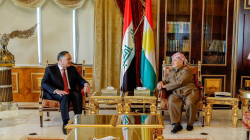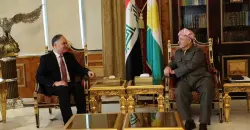Questions arise over al-Suleiman and al-Issawi's fate following their controversial return

Shafaq News / Although they returned to al-Anbar about two months ago, the disappearance of the Dulaim tribe prince Ali Hatem al-Suleiman and former Finance Minister Rafi al-Issawi, who ended up settling in Erbil, raised many question marks.
There are also threats of arresting and opening files dating back to when ISIS occupied the governorate.
"Ali Hatem al-Suleiman is a tribal Sheikh who has a significant place in al-Anbar's society, and his interest in the political file is the same as of any Iraqi citizen. He has nothing to do with al-Anbar's local government, its representatives in parliament, or the federal government," said Jassim al-Halbousi, deputy governor of al-Anbar.
"Some tried to exploit al-Suleiman's return to Iraq to sow strife in al-Anbar, but their attempts failed because the governorate's politicians and even Ali Hatem himself were more aware of political squabbles that are not in anyone's interest," al-Halbousi told Shafaq News agency.
"To avoid any problems that might affect the governorate, al-Suleiman left al-Anbar and went to stay in Kurdistan."
He added, "On the other hand, al-Issawi has problems with the federal government, not with al-Anbar's local government or its representatives, and he has already been issued arrest warrants. However, the speaker of parliament, Mohammed al-Halboosi, and the local government, helped drop them because they were aware of his innocence and these false accusations aimed at keeping al-Issawi away from the Iraqi political scene at the time."
"Judicial issues regarding the charges against al-Issawi have been resolved. As far as we know, he does not have a place in the next government nor his party."
Mustafa al-Dulaimi, a former member of the Iraqi opposition union, said, "Al-Suleiman and al-Issawi have the right to return. In fact, the Iraqi judiciary has been politicized in the past few years, and all those involved in the political process have been accused of terrorism and corruption."
"I do not know if Ali Hatem's departure from al-Anbar is related to a political or judicial issue, or an opportunity to prepare himself for his return to the governorate through a certain political project. However, al-Issawi is moving between al-Fallujah and Erbil and is in al-Anbar most of the time." al-Dulaimi, one of al-Suleiman's most prominent aides, told Shafaq News agency.
"Ali Hatem al-Suleiman is a tribal figure who I do not believe is greedy for a position, but al-Issawi has the right to return to the political front because he has been falsely accused and proven innocent."
Al-Dulaimi continued, "In coordination with other political and tribal figures in the western and southern governorates, as well as the youth of the Tishreen revolution, a political entity opposed to the current political process is close to its launch."
"All the political names that emerged after 2003 have perished, because it is all about trust. If a politician does not win the people's trust, everything they do will be for naught."
"The ruling political class has done nothing for the Iraqi people, especially the western regions, because there is no political figure who has been able to do justice to their residents or even demand their rights. All they have are slogans and promises made during a crisis," he added.
"Political differences occur in all Iraqi governorates and at all levels. It is a healthy phenomenon that will bring about change," said Ziad al-Arar, an Iraqi political researcher.
"The recent political differences in al-Anbar, some of which are political, are driven by other political parties from outside and within the governorate, and some of them are normal political movements," al-Arar told Shafaq News agency, adding, "Political disagreement should not harm the public interest, especially since the political process in Iraq is based on seats that in turn determine the strength of each party or political bloc."





